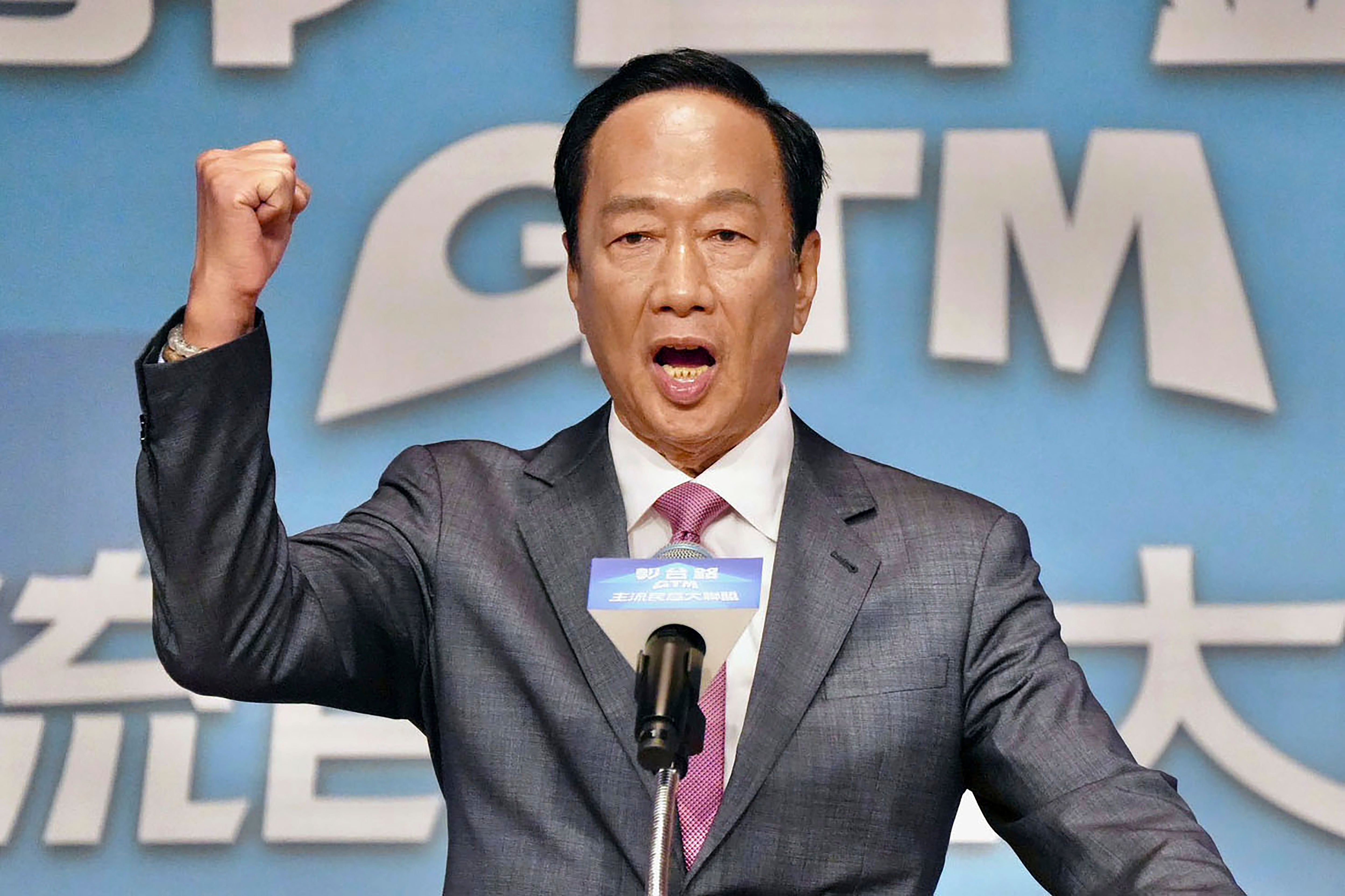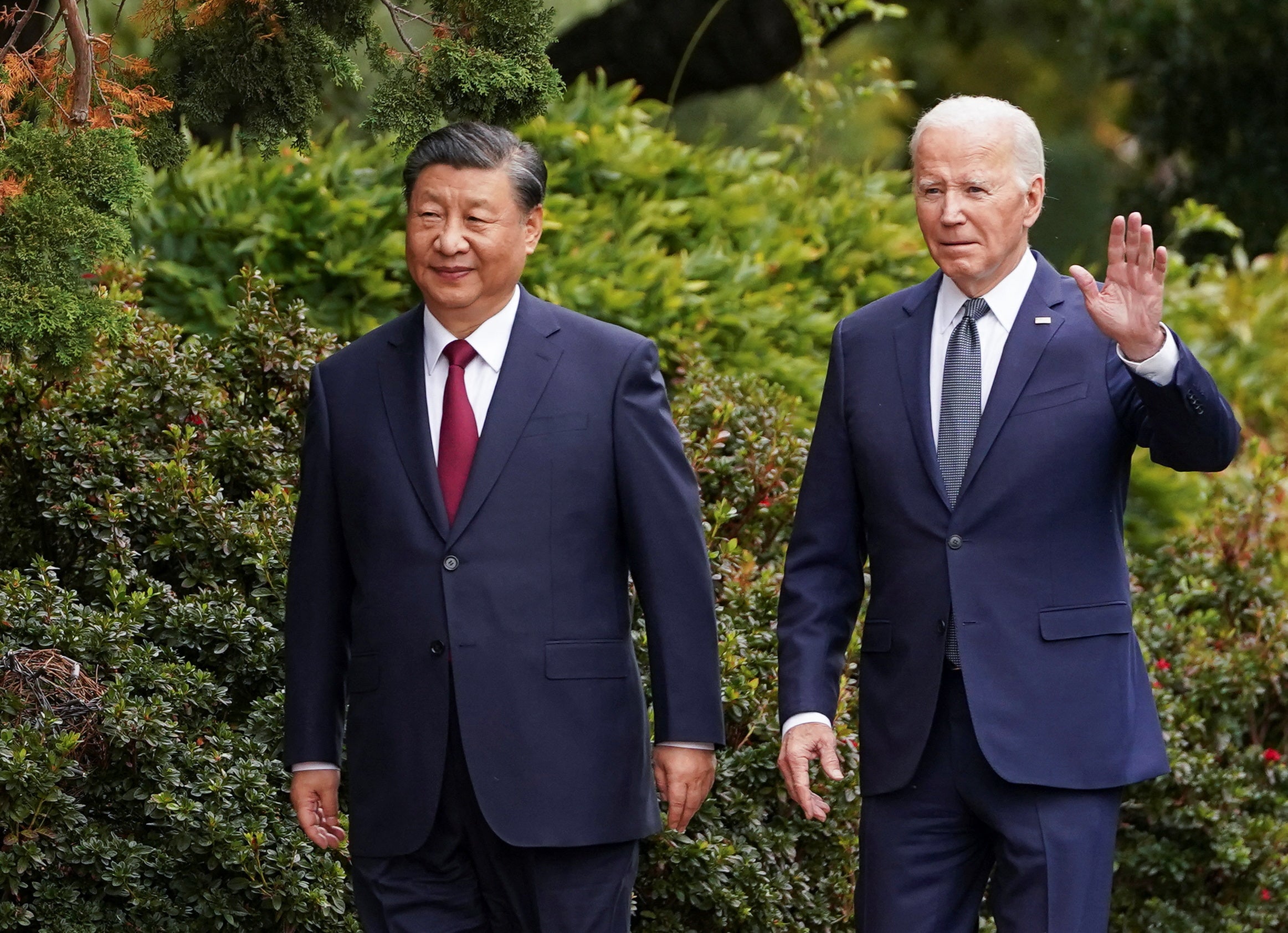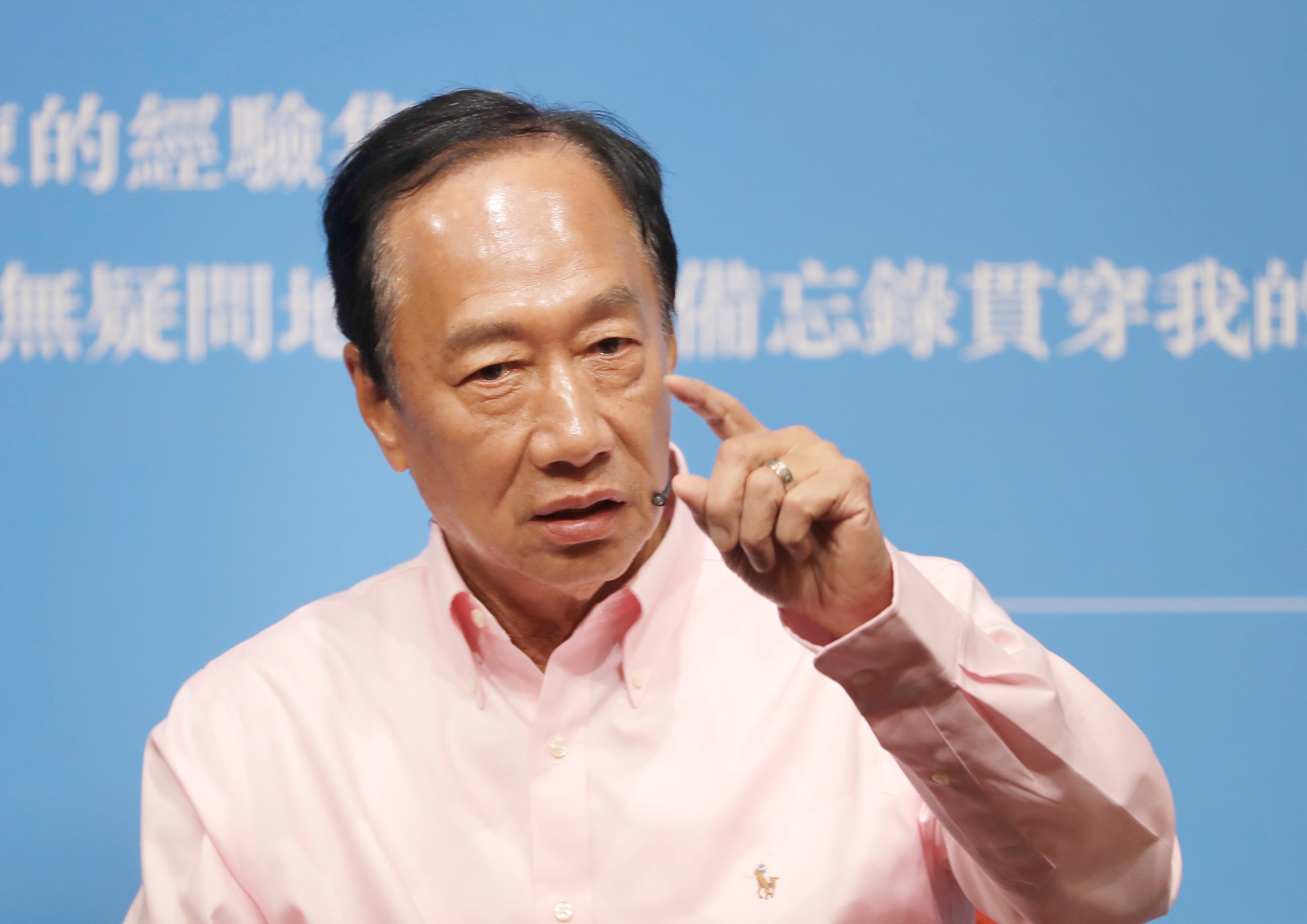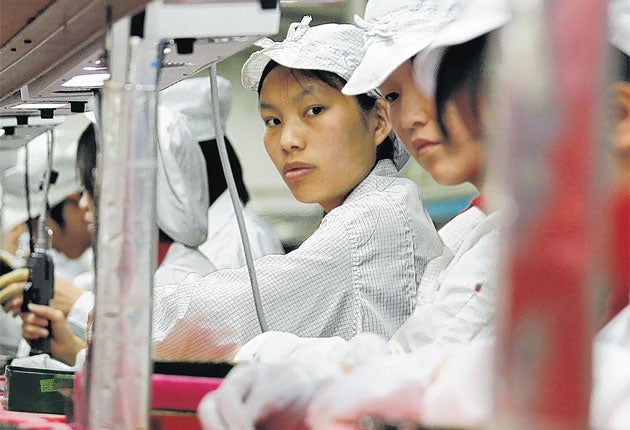Meet the tech billionaire whose foray into politics is stoking anger in China
US president Joe Biden and his Chinese counterpart Xi Jinping were all smiles this week. But for how long? Terry Gou’s bid to be Taiwan’s next president could provoke a new flashpoint between the two superpowers – and also be bad news for Apple – warns Adam Luck

Should you get an iPhone, iMac, a Nintendo Switch game, or Amazon Kindle this Christmas, then you should consider sending a thank you note to Terry Gou.
The Taiwanese billionaire has built a £5.5bn fortune by helping to revolutionise high-tech consumer goods and, with it, feed our addiction to electronic gadgets.
Gou, who has hailed the Mongol emperor Genghis Khan as his hero, has created in tech giant Foxconn a global empire that generated $200bn (£161bn) revenue last year. It boasts nearly 1 million employees, largely based in China, and a blue-chip roll call of clients that includes Microsoft, Dell and Sony, as well as Apple.
The Taiwanese colossus, which is the largest private employer in China, makes about half of all Apple’s products with one factory alone producing 500,000 iPhones a day.
But its founder Gou, whose love life is every bit as colourful as his hero, has now set himself on a collision course with the man hailed as the Red Emperor, China’s Xi Jinping.
This week, Gou was officially confirmed as a candidate for the president of Taiwan, the “renegade” island many experts predict could see China and the US go to war.
China sees Taiwan, which is a close US ally, as a breakaway province, which it has vowed to retake by force if necessary, and since 2021 military tensions have increased significantly.

With perfect timing, US president Joe Biden has this week hosted President Xi in San Francisco, the gateway to Silicon Valley, Apple, Google, and Facebook parent Meta.
Gou, who stepped down from Foxconn in 2019, threatens to spark yet another flashpoint between the superpowers, whatever the mood music this week. This is because he threatens to split the nationalist vote, which favours closer ties with China and could see the Democratic Progressive Party (DPP) retain power in the January election.
Many ponder whether yet another victory by the DPP – which sees Taiwan as an independent sovereign state – could be a provocation too far for Xi.
Last month, the Chinese authorities retaliated by announcing that Foxconn was the subject of multiple tax investigations, which could, in turn, threaten Apple’s lifeline.
Apple’s CEO Tim Cook will surely be watching on with some anxiety at the prospect of China taking a bite out of Foxconn and by extension the tech giant.
Foxconn expert Jenny Chan, a professor at Hong Kong Polytechnic University, said: “If Gou is elected then there will be uncertainty. Xi wants to influence the outcome in the Taiwanese elections and I believe the Chinese government is using the tax problems as an excuse to put pressure on Gou and Foxconn.
“Foxconn is an icon in economic and political terms and Beijing wants to make sure no one talks about Taiwanese independence.
“There is concern that the military tension might trigger conflict or at least exacerbate tension across the Taiwan Strait. Therefore, Gou’s candidacy brings into play all these issues at a sensitive strategic moment.”
The symbolism of the US and China choosing San Francisco has not been lost on observers because a key point of conflict revolves around the high-tech world Gou helped create. Successive US administrations have become increasingly concerned that China threatens the US’ technological and, by extension, military pre-eminence.
Professor Benjamin Selwyn, from the University of Sussex, said: “The US is quite happy to have China producing cheap, relatively low-tech goods. What the US is not happy with is China upgrading to more high-tech activities.
“The US is worried that in 20 years’ time, the US tech lead over China will be eroded or even eliminated. They want to limit China’s ability to develop as a high-end competitor.
“This is particularly true of anything that might have a military application. From the US perspective that is not permitted.
“They cannot countenance any challenge to the full spectrum of US dominance.”
Gou’s presidential ambitions shine a light on not just the tensions between the West and China, but also on a fragmenting globalisation.
But even if the 73-year-old appreciates the stakes are high, when Gou announced his bid for a presidential run in August this year, he was nothing if not bullish.
He said: “If the Chinese Communist party were to say, ‘If you don’t listen to me, I’ll confiscate your assets from Foxconn,’ I would say: ‘Yes please to it!’ I cannot follow their orders; I won’t be threatened.”
It takes a brave, or, some would say, foolish man, to take on the Chinese Communist Party (CCP), particularly since 2020, when President Xi has targeted the super rich.
A succession of Chinese billionaires and millionaires have fallen victim to Xi’s crackdown, whether because of alleged corruption or failure to bend the knee to the CCP.

At this point, it helps to step back and understand where Gou comes from.
His parents fled mainland China in 1949 alongside the nationalist forces, or Kuomintang (KMT), when Mao and the Communists prevailed after a long and bloody civil war.
In Taipei, his family lived in a temple annexe, but Guo’s first break came when he married his first wife Serena, whose family provided him with a loan to set up his company in 1974.
Known as Hon Hai Technology locally, it began making small parts for televisions and moved to mainland China in 1988 when the country opened up to external investment.
Gou’s big break came in 1996 when he persuaded Michael Dell, of Dell Computers, to work with him during an unscheduled visit to his factory in Guangdong, southern China.
Just like Mao, Gou crafted his own philosophy and even published his own little red book that emphasised iron discipline, unrelenting secrecy, and absolute loyalty to the leader.
He writes: “A leader must have the decisive courage to be a dictator for the common good.”
However, outside the factory gates, Gou led a rather more louche lifestyle, with the Taiwanese newspapers crafting his image as a playboy with a taste for leading ladies.
He stepped out with Hong Kong movie stars, was seen squiring models and singers, as well as acquiring an unwanted reputation for sailing close to the wind. This included 2007 newspaper claims, which he denied at the time, that he had been blackmailed by a former girlfriend who allegedly had a tape of them having sex together.
This came twinned with a court case where a journalist and her boyfriend were jailed for trying to extort $1m (£800,000) from Gou in order to kill a book she was writing about Foxconn.
Gou even bought his own Czech castle, which he refurbished at vast expense, but enjoyed staying in the shadows as far as the West was concerned.

In 2010, however, Gou and Foxconn would be plunged, alongside Apple, into a global scandal when it emerged that 14 employees had committed suicide.
Apple supremo Steve Jobs was forced to defend Foxconn, but, over the next two years, a steady stream of reports largely substantiated the allegations of abuse.
During Covid, Foxconn was dogged by workers’ protests over pay and conditions with footage emerging in 2022 of police beating staff outside the company’s Zhengzhou plant.
The pandemic also brought into focus the fragility of the global supply chains, with chronic shortages of many goods, and this, in turn, concentrated minds in Western capitals.
What would happen if China did indeed invade Taiwan? What would happen if China simply turned off the tap, not least of vital microchips, which Taiwan dominates?
With his nationalist background, Gou should, at face value, help dial down the tension.
But Taiwan expert Dafydd Fell, a professor at The School of Oriental & African Studies, believes that Gou’s candidacy concentrated minds both in Beijing and Taiwan.
Fell points out that this week the nationalist KMT, which favours closer ties with Beijing, and the centrist Taiwan People’s Party (TPP) announced an electoral pact.
This is because the incumbent DPP, which is detested by Beijing, leads the two rival parties in polls.
Fell said: “A KMT/TPP alliance is Beijing’s ideal scenario, but they could undermine it by military or verbal threats in the run-up to the election.
“It is likely China has been encouraging them to work together and the DPP will definitely try to frame the campaign this way.”
Professor Chan believes that Foxconn, like Gou, will require some deft positioning.
She said: “Foxconn could never find a better alternative to China as a production base, with a strong consumer market, so it will not suddenly relocate all the manufacturing elsewhere.
“But Foxconn has been shifting production to southeast Asia, India, and Latin America, and if the political circumstances change Foxconn would not want to rely solely on China. Indeed, for the last 10 years, they have been accelerating the move elsewhere to minimise the risks of being in China.”
In June this year, Foxconn CEO Young Liu confirmed that some Western clients have requested that their products be managed outside China because of political pressure.
He said: “We hope peace and stability will be something the leaders of these two countries will keep in mind. But as a business, as a CEO, I have to think about what if the worst case happens?”
Professor Chan points to an uncomfortable fact that gets lost in this debate.
She said: “Will the Chinese government hold Foxconn liable for abuses and exploitation? It appears everything is about political rights rather than workers’ rights.
“But Apple has also been compromised by these protests. It was revealed that they had disabled tools in China enabling workers to communicate with one another. So, Apple is not as clean and ethical as the image they project.”
So, should you be lucky enough to unwrap an iPhone this Christmas it might be worth reflecting on its true cost. A thought that is unlikely to detain Biden, Xi or Gou.
Apple, Gou, and Foxconn were all approached for comment






Join our commenting forum
Join thought-provoking conversations, follow other Independent readers and see their replies
Comments